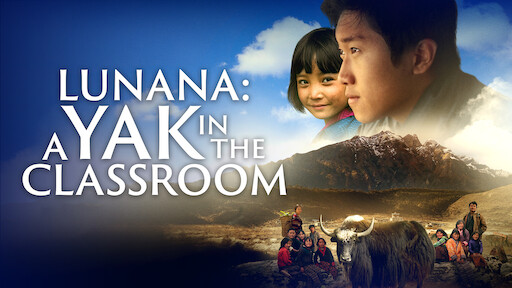It’s fair to say that Bhutan is quite a unique place. Landlocked between China, India and the Himalayas, they are one of three countries to have a dragon on their flag and the only government to measure wealth by Gross National Happiness. In 1999, restriction on television and internet was lifted, bringing forth the rise of the Bhutanese film industry. By 2011, they were producing roughly thirty films a year, spreading Buddhist-centric stories by literally moving makeshift cinemas between towns. Now, Bhutan has its first Oscar-nominated picture with Lunana: A Yak in the Classroom.
In his feature directorial debut, Pawo Choyning Dorji takes us to the isolated village of Lunana, an eight days walk from Thimphu. Far up into the mountains, he quickly establishes that life is very different compared to the capital city. Limited electricity means relying on petrified yak dung as fuel; scarce amounts of paper equate to a higher value than gold. Therefore, it’s the last place millennial Ugyen (Sherab Dorji) wants to go. Disenchanted after four years of government service teaching, his real dream is to sing in Australia. However, a lazy attitude has earned him the arduous journey to Bhutan’s most remote school.
Adapting to such unfamiliar surroundings behaves as the main comedic thread of the movie. Ugyen obnoxiously wears headphones whilst tapping away on his phone during dinner, presenting a mirror onto my own bad habits. Flashy “GORE-TEX” shoes are no match to the honest blue wellington boots of guide Michen (Ugyen Norbu Lhendup) and, on the first day of school, Ugyen is woken up by keen class captain Pem Zam after he oversleeps without an alarm. It’s all quite cliché through a Western lens, but acts as a harmless form of levity.
Where Lunana: AYITC does stand out is its heartwarming nature. Shooting on location and incorporating the villagers produces an inimitable feeling of authenticity. There’s genuine excitement from the class as Ugyen introduces them to toothpaste, or when they’re learning the English alphabet. One child wants to tutor just like Ugyen because ‘teachers can touch the future’, slowly re-inspiring him and melting the audience’s hearts. When you include the beautiful, traditional Dzongkha songs as well, there’s more to the film than the straightforward storytelling.
Overall, Lunana: A Yak in the Classroom’s message highlights the importance of education for everyone, whilst sharing a helpful reminder to look away from our phones and appreciate nature. Granted, you will have definitely heard this before, so many times in fact that it can lose all meaning, but what the film really offers is a special insight into why Bhutan is considered one of the happiest places on Earth.
